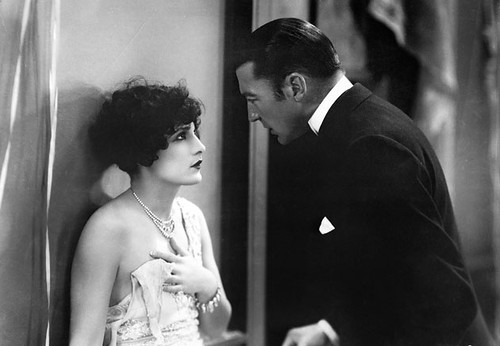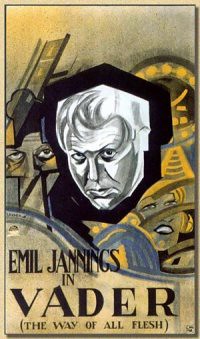Should any of these films become available, I promise to go back and review them.
---
The Devil Dancer (1927)
NOMINATED FOR: Best Cinematography (George Barnes)
Lost film, very little information on it. According to TCM, here's the plot:
"Takla, a white orphan brought up and kept captive in a Himalayan monastery, is rescued by Althestan, an adventurous Englishman who falls in love with her. His sister, displeased with her brother's choice, arranges to have Takla kidnaped. Althestan searches for her and eventually finds her with a troupe of itinerant Muslim entertainers."
---

Gilbert Roland as Johnny Powell in "The Dove"
The Dove (1927)
WON: Best Art Direction (William Cameron Menzies)
Only four reels out of nine of this film exist. You can find them at the Library of Congress. According to Wikipedia:
"Based on a play by Willard Mack, the original story is about a Mexican despot (played by [Noah] Beery), who falls in love with a dancing girl (played by [Norma] Talmadge), who rejects him. Due to the political repercussions of condemning Mexico, it was decided to relocate the plot to some anonymous Mediterranean country."
---

Glorious Betsy (1928)
NOMINATED FOR: Best Writing, Adaptation (Anthony Coldeway)
A partial sound film. Prints exist at Library of Congress, but some of the sound is missing. According to Wikipedia:
"The film is a semi-historical narrative and depicts the real-life courtship, marriage, and forced breakup of Jérôme Bonaparte, brother of Napoleon, and his wife from the American south, Elizabeth Patterson. Napoleon did not approve of the union (despite the fact that her family was one of the wealthiest in America) and the marriage was annulled. Jerome was subsequently forced to marry Catharina of Württemberg. They had one child, depicted in the movie, Jérôme Napoleon Bonaparte. In order to provide a "happy ending", Jerome in the film leaves France to be with his wife. However, in historical fact he remained in Europe."
---

Vilma Banky as Bianca in The Magic Flame (1927)
The Magic Flame (1927)
NOMINATED FOR: Best Cinematography (George Barnes)
Only five of the original eleven reels exist, and they're stored in the International Museum of Photography and Film at George Eastman House Archives. Here's the plot via TCM:
"Bianca, the aerial star of Baretti's circus, loves Tito, the clown, and resents the advances of the handsome Crown Prince of Illyria, who poses as Count Cassati. The prince pursues the wife of a neighboring squire and kills her husband when he discovers them together. Maddened by Bianca's refusals, the prince lures her to his hotel with a forged letter, but she drops from the window, using her gymnastic skill to escape. Tito comes to her aid and in a struggle with the prince casts him from the window into the sea. Bearing a striking resemblance to the prince, Tito assumes his identity and thus evades prosecution. Believing Tito to have been killed by the prince, Bianca leaves the circus to seek vengeance. During the coronation, she is about to assassinate the "prince" when he reveals his identity, and together they escape to the circus."
Here's a copy of the New York Times review of the film that goes into more detail, via a Vilma Bank fansite.
And if you want to go even MORE into detail, here's a novelization of the film, translated from a French magazine.
---
The Noose (1928)
NOMINATED FOR: Best Actor in a Leading Role (Richard Barthelmess)
Prints exist, one at the Museum of Modern Art in New York.
---

Richard Barthelmess in The Patent Leather Kid
The Patent Leather Kid (1927)
NOMINATED FOR: Best Actor in a Leading Role (Richard Barthelmess)
Prints exist. According to Wikipedia:
"[The film] tells the story of a boxer who scoffs at fighting outside the ring... particularly for the United States once it enters World War I. Eventually, he is drafted, is shipped overseas, and performs a heroic act, which results in his being severely wounded."
---

Lewis Stone and Maria Corda in The Private Life of Helen of Troy
The Private Life of Helen of Troy (1927)
NOMINATED FOR: Best Writing, Title Writing (Gerald C. Duffy)
About a half hour of this film exists at British Film Institute archives. Based on the novel by John Erskine.
---
A Ship Comes In (1928)
NOMINATED FOR: Best Actress in a Leading Role (Louise Dresser)
Very little information. Prints seem to exist, but I have no idea where.
---
Sorrell and Son (1927)
NOMINATED FOR: Best Director, Dramatic Picture (Herbert Brenon)
Long thought lost, a partially restored can be found at Academy Film Archive. The film was remade twice, once in 1934 and again in 1984. The plot according to IMDb:
"Stephen Sorrell, a decorated war hero, raises his son Kit alone after Kit's mother deserts husband and child in the boy's infancy. Sorrell loses a promising job offer and is forced to take work as a menial. Both his dignity and his health are damaged as he suffers under the exhausting labor and harsh treatment he receives as a hotel porter. But Sorrell thrives in the knowledge that his son will benefit from his labors. Sorrell has allowed the boy to believe his mother dead, but when the mother shows up, wanting to re-enter the young man's life, Sorrell must make hard decisions."
---

William Boyd, Mary Astor and Louis Wolheim in Two Arabian Knights
Two Arabian Knights (1927)
WON: Best Director, Comedy Picture (Lewis Milestone)
Long considered lost, a complete print was recently found and aired on Turner Classic Movies. There's a good chance I'll get to review this one in the future. Plot according to IMDb:
"Two American soldiers are captured by the Germans on the Western Front during World War One and escape a POW camp only to stumble into further life-threatening adventures when they come across an Arabian king's daughter while on the lam."
---

Evelyn Brent and George Bancroft in Underworld
Underworld (1927)
WON: Best Writing, Original Story (Ben Hecht)
This film still exists, but isn't available on DVD, and I haven't been able to find a copy of the VHS. It still gets screened at museums occasionally. I'll probably be able to review this in the near future. The plot according to IMDb:
"'Nobody helps me -- I help them!' boasts open-handed gangster Bull Weed, handing over what will prove to be the best investment in his high-spending career: a thousand dollars that will put the literate 'Rolls Royce' of vagrants back on his feet. Living it up in the Twenties with the aid of cool but smouldering moll Feathers, the Bull lords it over the law and his rivals alike -- specifically big Buck Mulligan, whose floral-tributes business echoes that of a certain real-life Chicago gangster... Yet Feathers, prize possession and object of envy, proves his weak point; and in the end, Bull Weed will indeed come to need help from others, and more than he has ever needed it before. But can Rolls Royce and Feathers still give it to him? And will the Bull accept?"
---

The Way of All Flesh (1927)
WON: Best Actor in a Leading Role (Emil Jannings)
This film is lost. It was remade in 1940. Here's the plot of the 1940 version according to IMDb:
"Paul Kriza is a cashier of a bank in a small town, and the happy husband of Anna and the father of four children. He is sent to New York to deliver some securities for the bank. There, he is tagged as easy-pickings by a con-game gang and Mary Brown, gang accomplice, proves he is. Waking up in the morning he discovers he has been robbed of the securities and, when he confronts the gang, he is hit on the head and taken out to be left on a railroad track. He comes to, struggles with the henchman and the man is killed when a train comes roaring by. Paul escapes but his watch is found and he is reported as the dead man. But he can't go home again."
Here is my review of The Last Command, the other film that won Emil Jannings the Oscar.
No comments:
Post a Comment